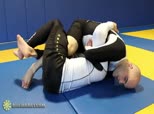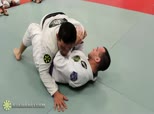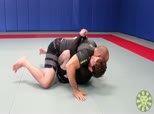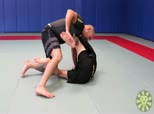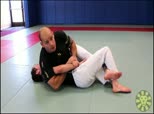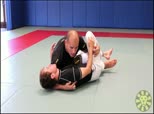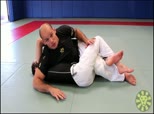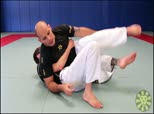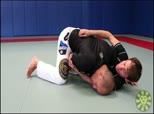James Puopolo No Gi Butterfly System 8 - Half Guard Guillotine to Mounted Guillotine
Add to Favorites Remove From Favorites 1331 3622 days ago
James shares an attack option if you were able to successfully sweep your opponent from butterfly guard but land in your opponent's half guard with the overhook grip. Rather than shrink back, we use the advantage of the overhook control to hunt for our opponent's neck and force our way to the mount.
Inside the University 140 - Half Guard Hip Switch Pass to Side Control or Mount and Side Smash Pass against Knee Shield
Add to Favorites 1807 Remove From Favorites 3664 days ago
Saulo covers the scenario on how to pass with the hip switch when you're in your opponent's half guard. He explains that once we've established the half guard, it is a mission to ensure that your opponent does not regain the guard or get the knee shield. He also covers how to transition immediately into a side smash pass should your opponent re-establish the knee shield.Xande No Gi Passing System 13 - Breaking the Double Under Butterfly Clinch and Forcing Half Guard
Add to Favorites 1518 Remove From Favorites 3711 days ago
Xande covers how to behave against the double under butterfly clinch, how to break the hold, and how to force the half guard.Xande No Gi Passing System 12 - Failed Opposite Side Smash to Forced Half against Knee Shield
Add to Favorites 1551 Remove From Favorites 3713 days ago
Following our opponents reaction we may be unable to complete the opposite side smash and need to settle for the forced half guard.Xande No Gi Passing System 10 - Smash Pass Attempt to Opposite Side Half Guard Transition
Add to Favorites 1542 Remove From Favorites 3715 days ago
In this lesson Xande begins to piece the previous few lessons together with another transition. This time we start with a side smash pass attempt then transition into the opposite side half guard instead. By having multiple options for each scenario, it allows us to react with the best possible response based off your opponent's actions.Xande No Gi Passing System 9 - Forcing Half Guard Transition from Side Smash Pass
Add to Favorites 1648 Remove From Favorites 3716 days ago
Xande teaches how to force the half guard off of a failed or attempted side smash pass. Sometimes your opponent may have a very good open guard and defense against your passing attempts. If you're having trouble with the pass, it may make for a better opportunity to pass to force the half guard guard game which they may not be good at.Xande No Gi Passing System 3 - Forcing Half Guard Super Hold to Esgrima Pass
Add to Favorites 2553 Remove From Favorites 3724 days ago
Often times it can be very difficult to control your opponent's hips enough to go straight for the pass. In many situations you may find it easier to force the half guard first to work your guard passes from there. In this lesson Xande teaches how to force the half guard super hold grip and then transitioning into the esgrima pass.Xande's No Gi Half Guard Passing 6 - Half Guard to Kimura or Straight Armlock
Add to Favorites 1686 Remove From Favorites 3763 days ago
When passing the half guard it's a good thing to work submissions in combination with your guard pass to keep your opponent on their toes. In this lesson we check out how to set up and finish the kimura or straight arm lock combination from the half guard.Xande's No Gi Half Guard Passing 5 - Classic Negative Half Guard Pass
Add to Favorites 1813 Remove From Favorites 3764 days ago
Xande teaches how to pass from the negative half guard. This negative side pass is highly effective and is a great option when you're having trouble passing with your knee slice or other half guard options.Xande's No Gi Half Guard Passing 4 - Half Guard Hip Switch Pass with Under Arm Control
Add to Favorites 1557 Remove From Favorites 3765 days ago
Sometimes it is necessary to make adjustments to our grips to better control our opponent during the hip switch pass. A fairly common situation is that your opponent may post against you as you try to switch your hips. In this case we use our arm to snake under our opponent's arm to establish an upper body control as we go for the hip switch.Xande's No Gi Half Guard Passing 3 - Half Guard Hip Switch Pass with Over Arm Control
Add to Favorites 1937 Remove From Favorites 3766 days ago
Xande teaches a couple of series to the hip switch half guard passes. We can use this pass to counter the lockdown or to pass the traditional half guard. The hip switch is a great option when you're unable to establish the esgrima grip or the superman hold on your opponent.Xande's No Gi Half Guard Passing 2 - Half Guard Esgrima Pass
Add to Favorites 2042 Remove From Favorites 3767 days ago
In this lesson Xande shares a way to utilize the underhook to pass your opponent's half guard. By keeping our opponent flat on their back with the hook and our weight we are able to free our leg to progress to the pass. The underhook is an important component to the pass. If your opponent is able to re-establish the underhook, the pass will fail as it opens up the opportunity for them to move to your back.
